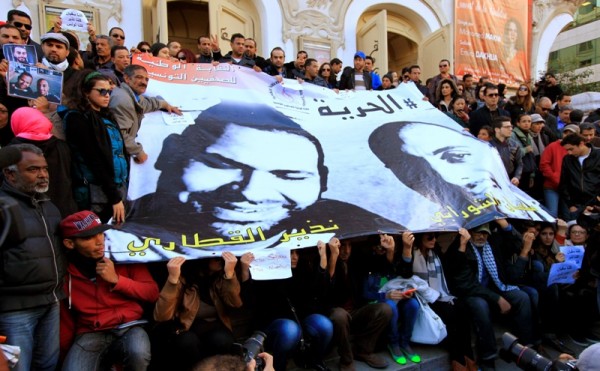Two years after the fall of Muammar Gaddafi, the news media in Libya enjoy greater freedom but the country remains a dangerous place for journalists, with numerous attacks reported in recent weeks and few signs that police and prosecutors are investigating the incidents.
Journalists interviewed by the International Press Institute (IPI) report widening insecurity since Gaddafi was killed by opposition forces on Oct. 20, 2011, ending his 42 years in power.
Since early August, there have been at least nine reports of journalists being abducted, assaulted or shot. Ezzedine Kousad, 28, was shot dead by three unidentified gunmen on Aug. 12, according to IPI’s Death Watch. Kousad had been working as a reporter for the independent Al Hurra television station since 2011.
Brian Conley, an American journalist who has worked and trained Libyan journalists for Small World News, said conditions for journalists were difficult. He was last in the country in September.
“Foreigners are limited by difficulties with visas, permissions, etc., as well as the potential for kidnapping or violence. At the moment, I believe violence against foreign journalists is down. However, it’s a different story for locals. There is a constant threat of reprisal by competing militias as well as the government. For myself, I didn’t experience anything firsthand on this [latest] trip.
“However,” Conley added, one of my students reported on what appeared to be a targeted killing outside the local hospital in Sebha. Generally Sebha seems to be a bit removed from a lot of the larger national fights, though it has its own local conflicts flaring up from time to time.”
Small World News, a U.S.-based training organisation, has been working in Libya since March 2011. “We arrived during the revolution and helped a local team of Libyan English teachers launch Alive in Libya, the first fact-based news agency in Libya,” Conley told IPI. “Since then our efforts have focused primarily on developing the capacity of Libyan journalists to think critically and produce high quality video news pieces.”
Asked if the situation has changed on the ground in Libya after Gaddafi’s fall, Conley told IPI by e-mail: “Sure, the situation has changed, but in my opinion it’s a period where there are a lot of growing pains, and sometimes it feels a bit like ‘meet the new boss, same as the old boss.’”
The news media are more free from state influence, though attacks on journalists occur with impunity and Conley sees news organisations as “increasingly controlled by actions of militias, or fear of militias. We can say that the media now is highlighted primarily by chaos at the moment, but I expect it will improve with time.”
“Unfortunately,” he said, “until there is a strong democratic state that endeavours to protect the independence of the media, both from the government and armed groups, the media should not be considered completely free. However, the access to social media sites and the revolutionary spirit has seen a huge uptick in media ventures all over Libya.”
Conley also said the news media struggle with amateurism and a focus on “quantity not quality.”
Mohamed Nasri, a Tunisian journalist, was in Libya in September to train journalists but found the environment difficult. “When asking the participants to prepare a report, the major problem is that people there didn’t accept to talk … they refuse to talk,” he explained. Security is another problem. “It is not safe because of the massive use of weapons there and the present of militias,” he said.
‘Unstable’ environment
IPI recently interviewed Libyan freelancer Majdi Elnakua about media freedom and conditions on the ground. “The situation is still unstable, you can’t judge whether it’s better or worse,” Elnakua said. “It’s a transition but people are frustrated with authority.”
He went on to explain how independent reporting is new in his home country and some people still have the impression they can stop things from being published. “I wouldn’t call Libyan media free just yet, it’s different from place to place.” According to Elnakua, it is more dangerous to operate in the South than the East or West of Libya, as many areas are still conflict zones.
Seraj Essul, who works for the Libya Herald, told IPI, “Despite the problems in Libya now, the situation for media is better than the situation for media during Gaddafi’s era.” But he said that journalists are facing difficulties and the biggest problems are the militias. “There are lots of militias in Libya and if any journalist wants to write a story on any militia they will try to stop you by all means.”
To highlight his point, Essul explained that his brother – also a journalist – was detained along with a foreign journalist by the Libyan militia while on the job. He said his brother was released the same day. “I think my brother was lucky because he was working with a foreigner journalist, otherwise he could ended up in a bad situation.”
“In my opinion the Libyan authority should do more to protect journalists, but I cannot blame them, if they cannot protect themselves,” Essul said.

